Sir Michael Redgrave (1908-1985) started his film career starring in the Hitchcock classic The lady Vanishes (1938). The English stage and film actor went on to star in many British and some Hollywood productions. He was the father of film actors Vanessa, Lynn and Corin Redgrave, and the grandfather of the late Natasha Richardson, Joely Richardson, Jemma Redgrave and Carlo Nero.
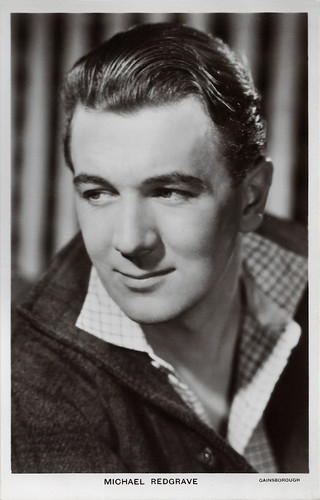
British postcard in the Picturegoer Series, London, no. 1217. Photo: Gainsborough.
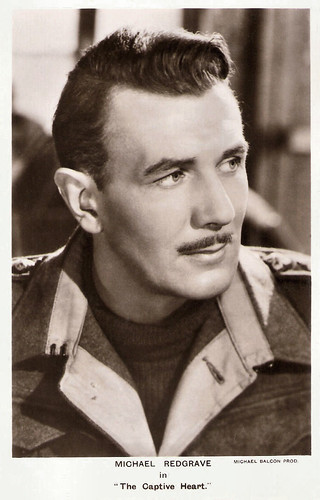
British postcard in the Picturegoer series, London, no. W 212. Photo: Michael Balcon Prod. Publicity still for The Captive Heart (Basil Dearden, 1946).
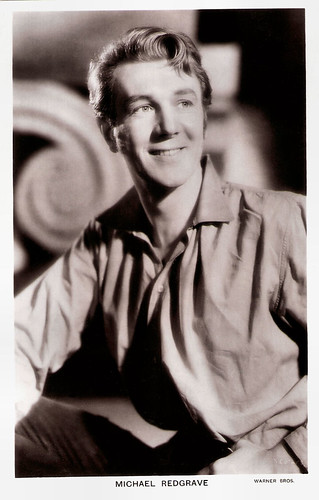
British postcard in the Picturegoer series, London, no. 1217a. Photo: Warner Bros.
Michael Scudamore Redgrave was born Bristol, England in 1908. He was the son of silent film actor Roy Redgrave and actress Margaret Scudamore. He never knew his father, who left when Michael was only six months old to pursue a career in Australia. His mother subsequently married Captain James Anderson, a tea planter, but Redgrave greatly disliked his stepfather.
He studied in Cambridge and tried journalism and teaching before giving acting a go. Redgrave made his first professional appearance at the Liverpool Playhouse in 1934, and spent two years with its Liverpool Repertory Company.
Here he met his future wife, actress Rachel Kempson. They married in 1935, and would have three children who would all become film actors: Vanessa Redgrave (1937), Corin Redgrave (1939-2010) and Lynn Redgrave (1943-2010).
In 1936, Tyrone Guthrie offered him a job at John Gielgud’s famous Old Vic theatre company in London. During the 1936-1937 season he appeared in Love's Labours Lost, The Country Wife, As You Like It, The Witch of Edmonton and Hamlet as Laertes to Laurence Olivier's Hamlet.
Michael Redgrave's first major film role was in The Lady Vanishes (Alfred Hitchcock, 1938) opposite Margaret Lockwood. His leading role as the eccentric musicologist in this huge success made him immensely popular.
Next he starred in Climbing High (Carol Reed, 1938) with Jessie Matthews, The Stars Look Down (Carol Reed, 1940) as an idealistic son of a mining family, and as an intelligent misanthrope in Thunder Rock (Roy Boulting, 1942) with James Mason.
War service put a temporary halt to his career, but even before that his involvement in the short-lived People's Convention (a Communist Party-backed anti-war movement) threatened to harm his standing. He served in the navy for a couple of years before he was invalided out with an injured arm.
The rest of the war, he spent in the theatre, though as the war drew to a close he made a film come-back as a poetic Flight-Lieutenant who is killed in The Way to the Stars (Anthony Asquith, 1945) with John Mills, and the Ealing compendium film Dead of Night (Alberto Cavalcanti a.o., 1945), in the chilling episode about a ventriloquist who thinks his dummy is out to get him.
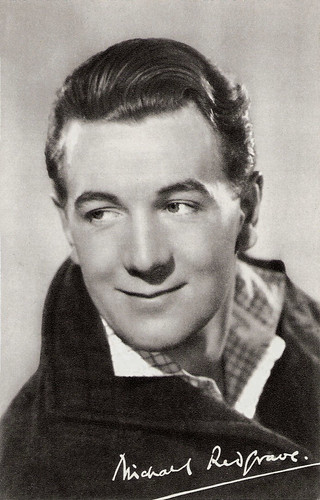
British postcard by Real Photogravure.
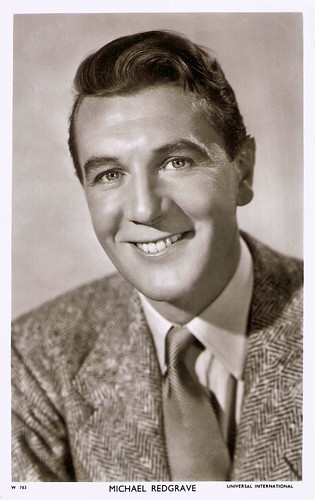
British postcard in the Picturegoer series, London, no. W 783. Photo: Universal International.
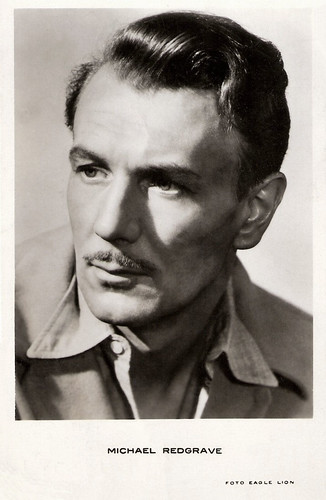
Dutch postcard. Photo: Eagle Lion.
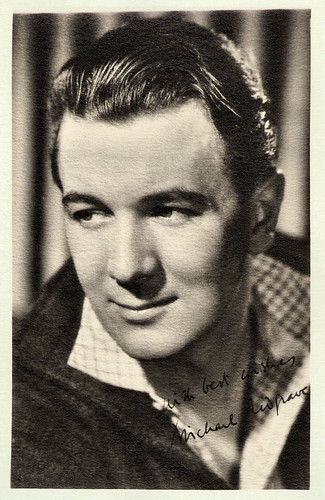
British autograph card.
For his first American film role in Mourning Becomes Electra (Dudley Nichols, 1947), Michael Redgrave was nominated for an Academy Award for Best Actor. On his return from Hollywood, he gave what is probably his finest film performance as a failed, embittered schoolmaster in The Browning Version (Anthony Asquith, 1951) opposite Jean Kent.
Redgrave also starred in The Importance of Being Earnest (Anthony Asquith, 1952), Mr. Arkadin (Orson Welles, 1955), The Dam Busters (Michael Anderson, 1955) and 1984 (Michael Anderson, 1956). He was appointed Commander of the Order of the British Empire (CBE) in 1952 and was knighted in 1959.
Throughout his career, Redgrave acted on the stage in Britain. One of his most notable roles was as the title character in Anton Chekhov's Uncle Vanya in 1962. He also excelled in Shakespearean roles.
During the 1960s he appeared in such classic films as the horror film The Innocents (Jack Clayton, 1961) starring Deborah Kerr, The Loneliness of the Long Distance Runner (Tony Richardson, 1962) with Tom Courtenay, and the war drama The Hill (Sidney Lumet, 1965) with Sean Connery.
Though his film work became less distinguished in the following decade, his theatre work continued its high standard. He toured extensively in the 1970s, until the effects of Parkinson's disease grew too great. His last film appearance was in Rime of the Ancient Mariner (Raul daSylva, 1975), based on the poem by Samuel Taylor Coleridge.
Michael Redgrave passed away in 1985 in Denham, England only one day after his 77th birthday. Until his death he was married with Rachel Kempson. Their grandchildren - Natasha and Joely Richardson, Jemma Redgrave and Carlo Nero are also film actors.
During the filming of Secret Beyond the Door... (Fritz Lang, 1947), Redgrave met Bob Michell. They became lovers. In his last autobiography he wanted to acknowledge his bisexuality, but in the end he chose to remain silent about it. Later his son Corin wrote about in Michael Redgrave: My Father (1995).
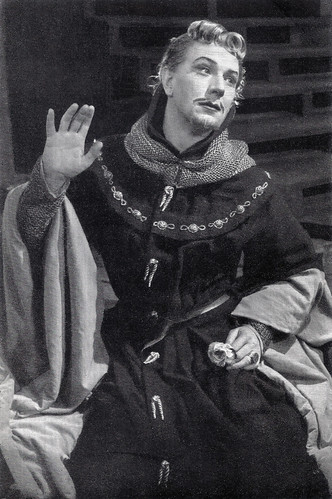
British postcard in the Shakespeare Memorial Theatre series, no. 15. Photo: Angus McBean. Michael Redgrave as King Richard II in Richard II, Stratford-upon-Avon, 1951.
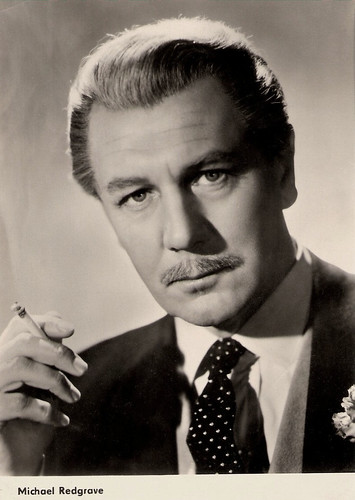
East-German postcard by VEB Progress Filmvertrieb, Berlin, no. 1445. Retail price: 0,20 DM. Publicity still for Behind the Mask (Brian Desmond Hurst, 1958).
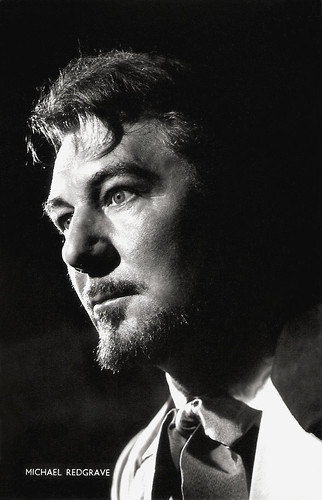
British card. Publicity still for a stage production of Uncle Vanya by Anton Chekhov in Chichester in 1963.
Sources: Brian McFarlane (Encyclopaedia of British Cinema), David Absalom (British Pictures), Britmovie, Wikipedia, and IMDb.

British postcard in the Picturegoer Series, London, no. 1217. Photo: Gainsborough.

British postcard in the Picturegoer series, London, no. W 212. Photo: Michael Balcon Prod. Publicity still for The Captive Heart (Basil Dearden, 1946).

British postcard in the Picturegoer series, London, no. 1217a. Photo: Warner Bros.
The Lady Vanishes
Michael Scudamore Redgrave was born Bristol, England in 1908. He was the son of silent film actor Roy Redgrave and actress Margaret Scudamore. He never knew his father, who left when Michael was only six months old to pursue a career in Australia. His mother subsequently married Captain James Anderson, a tea planter, but Redgrave greatly disliked his stepfather.
He studied in Cambridge and tried journalism and teaching before giving acting a go. Redgrave made his first professional appearance at the Liverpool Playhouse in 1934, and spent two years with its Liverpool Repertory Company.
Here he met his future wife, actress Rachel Kempson. They married in 1935, and would have three children who would all become film actors: Vanessa Redgrave (1937), Corin Redgrave (1939-2010) and Lynn Redgrave (1943-2010).
In 1936, Tyrone Guthrie offered him a job at John Gielgud’s famous Old Vic theatre company in London. During the 1936-1937 season he appeared in Love's Labours Lost, The Country Wife, As You Like It, The Witch of Edmonton and Hamlet as Laertes to Laurence Olivier's Hamlet.
Michael Redgrave's first major film role was in The Lady Vanishes (Alfred Hitchcock, 1938) opposite Margaret Lockwood. His leading role as the eccentric musicologist in this huge success made him immensely popular.
Next he starred in Climbing High (Carol Reed, 1938) with Jessie Matthews, The Stars Look Down (Carol Reed, 1940) as an idealistic son of a mining family, and as an intelligent misanthrope in Thunder Rock (Roy Boulting, 1942) with James Mason.
War service put a temporary halt to his career, but even before that his involvement in the short-lived People's Convention (a Communist Party-backed anti-war movement) threatened to harm his standing. He served in the navy for a couple of years before he was invalided out with an injured arm.
The rest of the war, he spent in the theatre, though as the war drew to a close he made a film come-back as a poetic Flight-Lieutenant who is killed in The Way to the Stars (Anthony Asquith, 1945) with John Mills, and the Ealing compendium film Dead of Night (Alberto Cavalcanti a.o., 1945), in the chilling episode about a ventriloquist who thinks his dummy is out to get him.

British postcard by Real Photogravure.

British postcard in the Picturegoer series, London, no. W 783. Photo: Universal International.

Dutch postcard. Photo: Eagle Lion.

British autograph card.
The Importance of Being Earnest
For his first American film role in Mourning Becomes Electra (Dudley Nichols, 1947), Michael Redgrave was nominated for an Academy Award for Best Actor. On his return from Hollywood, he gave what is probably his finest film performance as a failed, embittered schoolmaster in The Browning Version (Anthony Asquith, 1951) opposite Jean Kent.
Redgrave also starred in The Importance of Being Earnest (Anthony Asquith, 1952), Mr. Arkadin (Orson Welles, 1955), The Dam Busters (Michael Anderson, 1955) and 1984 (Michael Anderson, 1956). He was appointed Commander of the Order of the British Empire (CBE) in 1952 and was knighted in 1959.
Throughout his career, Redgrave acted on the stage in Britain. One of his most notable roles was as the title character in Anton Chekhov's Uncle Vanya in 1962. He also excelled in Shakespearean roles.
During the 1960s he appeared in such classic films as the horror film The Innocents (Jack Clayton, 1961) starring Deborah Kerr, The Loneliness of the Long Distance Runner (Tony Richardson, 1962) with Tom Courtenay, and the war drama The Hill (Sidney Lumet, 1965) with Sean Connery.
Though his film work became less distinguished in the following decade, his theatre work continued its high standard. He toured extensively in the 1970s, until the effects of Parkinson's disease grew too great. His last film appearance was in Rime of the Ancient Mariner (Raul daSylva, 1975), based on the poem by Samuel Taylor Coleridge.
Michael Redgrave passed away in 1985 in Denham, England only one day after his 77th birthday. Until his death he was married with Rachel Kempson. Their grandchildren - Natasha and Joely Richardson, Jemma Redgrave and Carlo Nero are also film actors.
During the filming of Secret Beyond the Door... (Fritz Lang, 1947), Redgrave met Bob Michell. They became lovers. In his last autobiography he wanted to acknowledge his bisexuality, but in the end he chose to remain silent about it. Later his son Corin wrote about in Michael Redgrave: My Father (1995).

British postcard in the Shakespeare Memorial Theatre series, no. 15. Photo: Angus McBean. Michael Redgrave as King Richard II in Richard II, Stratford-upon-Avon, 1951.

East-German postcard by VEB Progress Filmvertrieb, Berlin, no. 1445. Retail price: 0,20 DM. Publicity still for Behind the Mask (Brian Desmond Hurst, 1958).

British card. Publicity still for a stage production of Uncle Vanya by Anton Chekhov in Chichester in 1963.
Sources: Brian McFarlane (Encyclopaedia of British Cinema), David Absalom (British Pictures), Britmovie, Wikipedia, and IMDb.
No comments:
Post a Comment